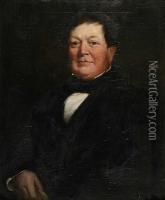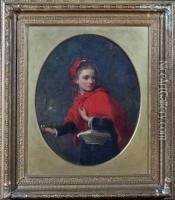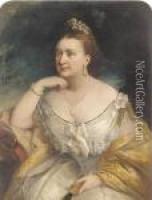James Edgell Collins Paintings
James Edgell Collins was an English artist and illustrator born in 1887. His life spanned the transition from the late Victorian era into the modern age, witnessing significant changes in the arts and society. Collins was primarily known for his detailed and evocative illustrations, which captured the essence of English life and landscapes during the early 20th century. His work reflects the influence of the Arts and Crafts movement, which emphasized traditional craftsmanship and the beauty of natural forms, as well as the emerging modernist trends that sought to break with the past and explore new artistic expressions.
Collins received his formal art education at the Royal College of Art in London, where he was exposed to a wide range of artistic styles and techniques. This education not only honed his skills as an illustrator but also instilled in him a deep appreciation for the interplay between art and society. Throughout his career, he contributed illustrations to various magazines and books, which helped to popularize his work among a broader audience. His illustrations often featured scenes from rural England, capturing the tranquility and timeless beauty of the countryside with a remarkable attention to detail and a deep sensitivity to the changing seasons and light.
Despite his success as an illustrator, Collins's work also extended to painting, where he explored more personal and introspective themes. His paintings, although less known than his illustrations, exhibit a keen understanding of color and composition, and they often convey a sense of serenity and contemplation. Collins was a member of several art societies and exhibited his work widely during his lifetime, gaining recognition and respect from his peers.
James Edgell Collins's contribution to English art is marked by his ability to capture the essence of his time through a delicate balance of tradition and innovation. His illustrations serve as a visual record of a bygone era, while his paintings offer a more introspective and universal appeal. Collins passed away in 1957, leaving behind a body of work that continues to be appreciated for its technical skill, artistic beauty, and historical significance.


